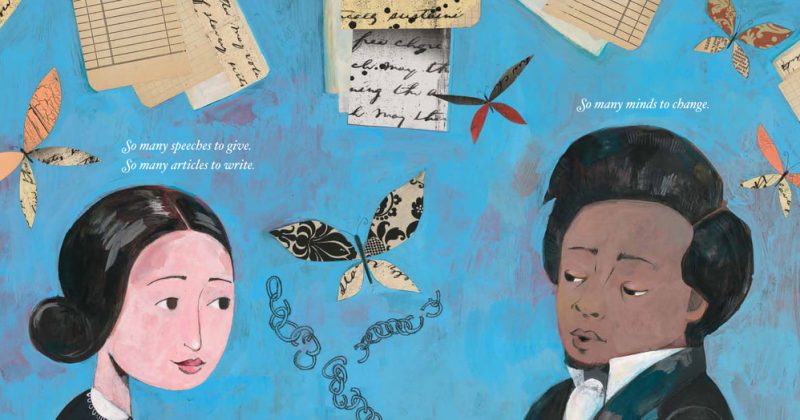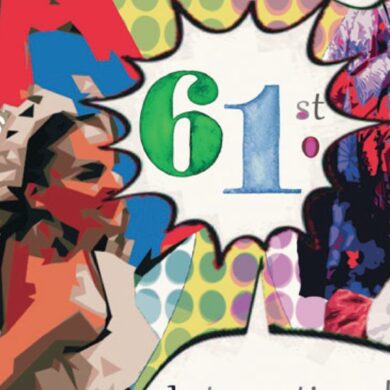The story of two uncommonly courageous people who met in their twenties and spent the rest of their lives determined “to help each other, so one day all people could have rights.”
by Maria Popova
“How can we use each other’s differences in our common battles for a livable future?” Audre Lorde asked while traveling in a divided world a generation after the landmark Universal Declaration of Human Rights declared that “recognition of the inherent dignity and of the equal and inalienable rights of all members of the human family is the foundation of freedom, justice and peace in the world.” Another generation earlier — an interval imperceptible on the timescales of our evolutionary history — these rights were reserved for only one class of human family members: white men.
That a civilization was able to broaden the legal aperture of civic agency and human dignity so dramatically in so short a time was the triumph of two parallel and consanguine movements: women’s suffrage and abolition, propelled by a small, unrelenting tribe of pioneers in the middle of the nineteenth century. The most active and ardent of them were women — women like Susan B. Anthony and Julia Ward Howe, who spoke and wrote and rallied unrelentingly for human rights and civic agency; women like astronomer and abolitionist Maria Mitchell, who swung open the gates to women’s education in science and whose lovely lifelong friendship with Frederick Douglass was an honor to both; women who, in the aftermath of the Civil War, diverted their suffrage efforts from securing the vote for themselves to securing the vote for African Americans — parallel efforts for which Margaret Fuller had furnished the catalytic spark with her insistence that “while any one is base, none can be entirely free and noble.” (In a disquieting recompense for these women’s efforts, the right to vote was extended to black men half a century before it was extended to women of any ethnicity.)
In the city of Rochester in upstate New York there stands — or, rather, sits — a bronze sculpture depicting two of these courageous champions of freedom having tea: Frederick Douglass (1818–1895) and Susan B. Anthony (1820–1906), whose neighboring braveries blossomed into a real friendship after both moved to Rochester around the same time in their late twenties. It was in Rochester that Anthony voted in a presidential election, well aware she was going to be arrested for it; it was in Rochester that Douglass launched his epoch-making abolitionist newspaper (which he titled the North Star, in homage to the central role of astronomy in the Underground Railroad).
Inspired by the sculpture and the beautiful camaraderie behind it, Two Friends: Susan B. Anthony and Frederick Douglass (public library) by Dean Robbins, illustrated by Selina Alko and Sean Qualls, tells the story of these two pioneering lives entwined in friendship through an imaginary evening of tea and cake.
We see each of them transcend the givens of their condition: Susan, excluded from formal education on account of her gender, educates herself in the founding ideals of her country and is galled by the hypocrisy of proclaiming the rights to live free and to vote, but denying those rights to more than half; Frederick, enslaved, teaches himself to read and write, then learns about the same ideals and is galled by the same hypocrisy of exclusion.
We see Frederick clad in his “gentleman’s jacket, vest, and tie,” and Susan in “a kind of pants called ‘bloomers,’” which she prefers over the cumbersome skirts that make it “hard to get things done.”
Both of them teach themselves to give speeches on justice and equality, both of them deliver those speeches before audiences to the applause of some and the vocal dismay of others, until the two eventually meet in Rochester and promise “to help each other, so one day all people could have rights.”
And so they do: We see them discuss their ideas and their plans over tea and cake and warm conspiratorial smiles.
So many speeches to give.
So many articles to write.
So many minds to change.
Couple Two Friends with a wondrous celebration of the rebels who won women political power, illustrated by the incomparable Maira Kalman, then savor other picture-book biographies of cultural heroes, pioneers, and visionaries: John Lewis, Keith Haring, Wangari Maathai, Maria Mitchell, Ada Lovelace, Louise Bourgeois, E.E. Cummings, Jane Goodall, Jane Jacobs, Frida Kahlo, Louis Braille, Pablo Neruda, Albert Einstein, Muddy Waters, and Nellie Bly.



















